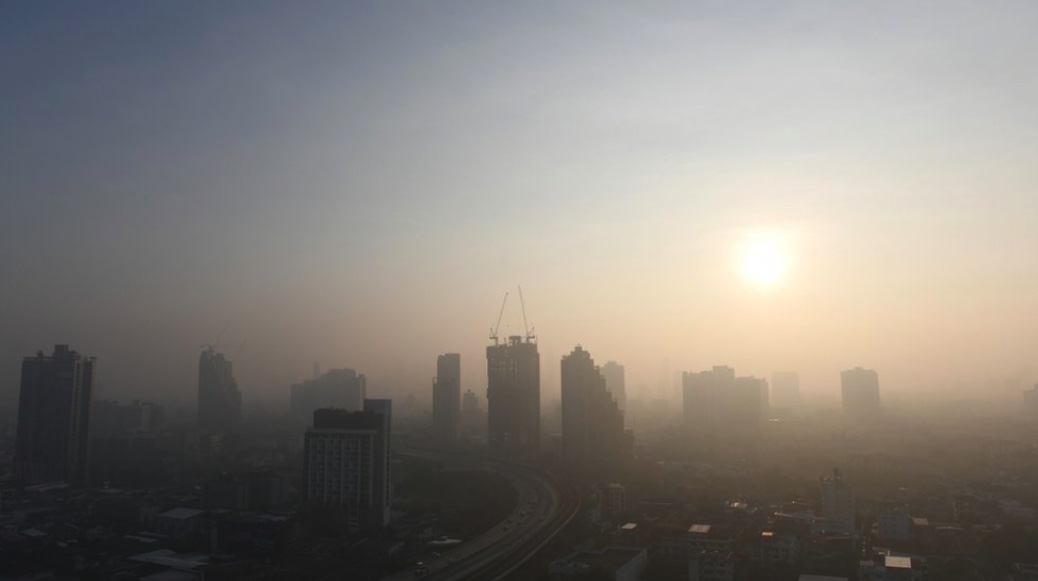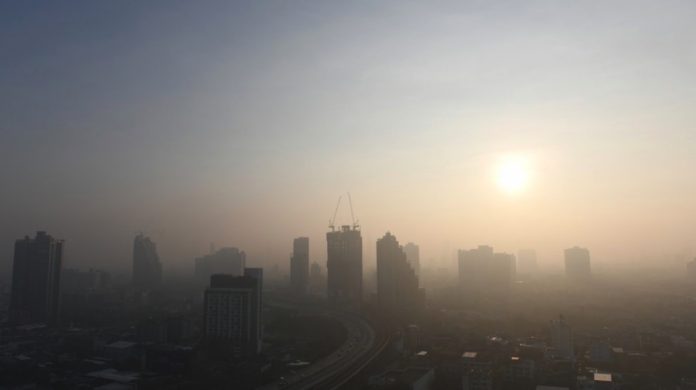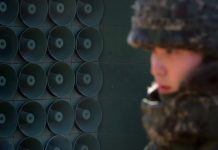กรุงเทพฯ – วันนี้ (23 มกราคม 2568) สถานการณ์ฝุ่นละอองขนาดเล็ก PM2.5 ในพื้นที่กรุงเทพมหานครและปริมณฑลมีค่าพุ่งสูงขึ้นจนเกินค่ามาตรฐานในหลายเขต ส่งผลกระทบโดยตรงต่อสุขภาพของประชาชน โดยเฉพาะกลุ่มเสี่ยง เช่น เด็กเล็ก ผู้สูงอายุ และผู้ป่วยโรคระบบทางเดินหายใจ
ค่าฝุ่น PM2.5 พุ่งเกินมาตรฐานในหลายพื้นที่
กรมควบคุมมลพิษรายงานว่า ค่าฝุ่นละอองขนาดเล็ก PM2.5 ในบางพื้นที่ของกรุงเทพฯ อยู่ในระดับ “มีผลกระทบต่อสุขภาพ” โดยพื้นที่ที่มีค่าฝุ่นสูงที่สุดในวันนี้ ได้แก่ เขตบางเขน เขตบางกะปิ และเขตดินแดง ซึ่งมีค่าฝุ่นสูงกว่า 100 ไมโครกรัมต่อลูกบาศก์เมตร เกินกว่าค่ามาตรฐานที่กำหนดไว้ที่ 50 ไมโครกรัมต่อลูกบาศก์เมตร
ผลกระทบต่อสุขภาพและคำเตือนจากหน่วยงาน
แพทย์ผู้เชี่ยวชาญด้านโรคทางเดินหายใจเตือนว่า การได้รับฝุ่น PM2.5 ในระดับสูงอาจส่งผลกระทบต่อระบบทางเดินหายใจ รวมถึงเพิ่มความเสี่ยงต่อโรคหัวใจและหลอดเลือด สำหรับผู้ที่มีโรคประจำตัว เช่น โรคหอบหืดหรือโรคปอดอุดกั้นเรื้อรัง อาจมีอาการกำเริบหรือแย่ลง
กรมอนามัยแนะนำให้ประชาชนหลีกเลี่ยงการทำกิจกรรมกลางแจ้งในช่วงเวลาที่ค่าฝุ่นสูง หากจำเป็นต้องออกนอกบ้าน ควรสวมหน้ากากป้องกันฝุ่นที่มีคุณภาพ เช่น หน้ากาก N95 และควรปิดประตูหน้าต่างเพื่อป้องกันฝุ่นเข้าภายในบ้าน
มาตรการแก้ไขปัญหาจากภาครัฐ
ภาครัฐได้ออกมาตรการฉุกเฉินเพื่อลดผลกระทบจากปัญหา PM2.5 เช่น การควบคุมการเผาในที่โล่งในเขตชานเมือง การตรวจสอบและจำกัดการปล่อยควันดำจากยานพาหนะ และการฉีดพ่นละอองน้ำในพื้นที่ที่มีค่าฝุ่นสูง
นายชัชชาติ สิทธิพันธุ์ ผู้ว่าราชการกรุงเทพมหานคร ได้ออกมาแถลงข่าวว่า “กรุงเทพฯ กำลังเผชิญกับปัญหามลพิษทางอากาศที่รุนแรง ซึ่งจำเป็นต้องอาศัยความร่วมมือจากทุกฝ่ายทั้งภาครัฐ เอกชน และประชาชน ในการแก้ไขปัญหาและลดมลพิษในระยะยาว”
การป้องกันตัวเองจาก PM2.5
-
สวมหน้ากาก N95 หรือหน้ากากที่สามารถกรองฝุ่น PM2.5 ได้
-
ลดการออกจากบ้านหรือทำกิจกรรมกลางแจ้งในช่วงที่ค่าฝุ่นสูง
-
ใช้เครื่องฟอกอากาศในบ้านหรือที่ทำงาน
-
ติดตามข้อมูลคุณภาพอากาศผ่านแอปพลิเคชันหรือเว็บไซต์ของกรมควบคุมมลพิษ
ประชาชนสามารถติดตามข้อมูลค่าฝุ่น PM2.5 แบบเรียลไทม์ได้ผ่านแอปพลิเคชัน Air4Thai หรือเว็บไซต์ของกรมควบคุมมลพิษ เพื่อวางแผนการใช้ชีวิตประจำวันและป้องกันตนเองจากผลกระทบของมลพิษทางอากาศ
สถานการณ์ PM2.5 ที่เกิดขึ้นในครั้งนี้เป็นสัญญาณเตือนถึงความจำเป็นในการจัดการปัญหามลพิษอย่างยั่งยืน เพื่อสร้างสังคมที่มีคุณภาพอากาศที่ดีสำหรับทุกคนในระยะยาว
PM2.5 Levels Soar in Bangkok: A Crisis Situation Impacting Public Health

Bangkok – Today (January 23, 2025), the levels of PM2.5 fine particulate matter in Bangkok and its surrounding areas have risen significantly, surpassing the standard limits in several districts, directly affecting public health, particularly vulnerable groups such as children, the elderly, and individuals with respiratory conditions.
PM2.5 Levels Exceed Standards in Several Areas
The Pollution Control Department reports that the PM2.5 levels in certain areas of Bangkok are now at levels considered “harmful to health.” The areas with the highest PM2.5 levels today include Bang Khen, Bang Kapi, and Din Daeng, where the particulate matter exceeds 100 micrograms per cubic meter, surpassing the standard limit of 50 micrograms per cubic meter.
Health Impacts and Warnings from Authorities
Respiratory specialists warn that prolonged exposure to high levels of PM2.5 can harm the respiratory system and increase the risk of heart and blood vessel diseases. For individuals with underlying conditions such as asthma or chronic obstructive pulmonary disease (COPD), symptoms may worsen.
The Department of Health recommends that the public avoid outdoor activities during periods of high pollution. If necessary, individuals should wear high-quality dust masks, such as N95 masks, and keep doors and windows closed to prevent dust from entering their homes.
Government Measures to Address the Issue
The government has implemented emergency measures to mitigate the impact of PM2.5, such as controlling open burning in suburban areas, inspecting and limiting vehicle emissions, and spraying water in areas with high particulate levels.
Bangkok Governor, Mr. Chatchat Sittipunt, stated in a press conference, “Bangkok is facing a serious air pollution issue, and it is essential that all sectors – government, private, and the public – cooperate to resolve the issue and reduce pollution in the long term.”
Self-Protection Measures Against PM2.5
-
Wear an N95 mask or a mask that can filter out PM2.5 particles.
-
Minimize outdoor activities during high pollution periods.
-
Use air purifiers in homes or workplaces.
-
Follow air quality updates via apps or the Pollution Control Department’s website.
The public can track real-time PM2.5 levels through the Air4Thai app or the Pollution Control Department’s website to plan their daily activities and protect themselves from the effects of air pollution.
This current PM2.5 situation serves as a warning of the urgent need for sustainable pollution management to create a society with good air quality for everyone in the long term.
Photo : BBC New Thailand

















